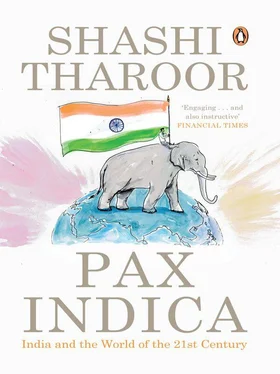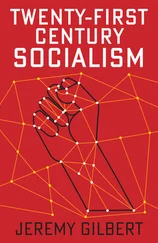One of the immediate implications of serving on the Council was the need to take positions on matters that in recent years some Indian mandarins have preferred to duck. These all proved to be matters that called for creative and courageous thinking, going beyond entrenched positions or reflexive allegiance to non-aligned solidarity. As one Indian critic trenchantly observed, ‘It’s no use saying India deserves a permanent seat at the UNSC because it represents one-sixth of humanity, if that one-sixth of humanity seldom expresses an opinion.’ It is difficult to argue that India consistently passed the test; some of the bureaucratic and political contortions preceding its policy statements in certain areas led to contradictory and sometimes confused positions, not always rendered clearer by the official ‘explanation of votes’ that followed.
But the experience undoubtedly helped India come to terms with the new expectations of it in the changed global environment. One example was the difference between being an ‘outsider’ in the perennial jurisdictional quarrels between the Security Council and the General Assembly, to being a privileged insider. For instance, India had to reconsider its traditional opposition to the Council’s tendency to broaden its own mandate by taking on issues New Delhi generally feels belong properly to the General Assembly. The Council has tended to stretch into areas like the prevalence of HIV/AIDS, climate change and the empowerment of women, which go beyond any strict construction of the term ‘peace and security’. And yet, as a member both of the G20 and the Security Council, India may well see an interest in bringing up issues of food security or energy security, which touch on the core concerns of both groups and which afford an intriguing opportunity to take advantage of the interconnections between them.
On the whole, its performance served as an effective dress rehearsal for a more enduring role on the world body’s premier decision-making organ. All in all, India’s place on the Council offered an extraordinary opportunity, after two decades of absence from the global high table, to demonstrate to the world what twenty-first-century India is capable of. It used that opportunity to project itself as a responsible global power, one with its own independent views on major issues, and as a key voice on issues such as peacekeeping, human rights and counterterrorism, on which its own experience and perspective were of inestimable value to the international community. Though there are still several months of India’s second year to go as I write these words, India should emerge from the experience with its reputation and credibility as a major global player enhanced. In any case, the world has been watching.
India has a long record of tangible contributions to the United Nations, for example as an outstanding champion of the principle and practice of technical cooperation for development — I believe it has provided more technical experts to the UN than any other country. It has also long been an effective voice on issues like the management of outer space, where its possession of a credible capacity in rocket and satellite development gives its views added heft. Similarly, its global status in the information technology arena makes it a natural to play a leading role in the governance of the Internet and in the emerging field of cyber security. On environmental issues, it has steered a careful course between accepting the common responsibility of humankind to protect the ozone layer through ecologically sound policies and defending the rights of developing countries to pull their people out of poverty despite some negative environmental consequences. (Given the unequal distribution of costs and benefits of mitigation measures required to promote a more sustainable use of the world’s ecological resources while promoting the urgent task of human development, the environment is an archetypal issue for the management of the global commons, and India’s role could be indispensable in helping craft the right policy framework, including, for instance, the transfer of ‘green technologies’ at affordable cost to the developing world.) India has even sent expeditions to the Antarctic Ocean in order not to miss out on staking a legitimate claim to being heard and respected on the issue of how that last unexplored territory is to be handled. Its navy has participated in international humanitarian and anti-piracy missions, both within and outside the aegis of the United Nations. All these are harbingers of the greater exercise of global responsibility across the wide range of domains in which the only possible effective action is the multilateral. (And more could soon follow, on such issues as the acidification of oceans, improved mechanisms to handle disputes in international waters and conflicts over maritime jurisdiction.)
All these challenges and opportunities could bring the best out of India, but they will also tax India’s capacity to organize its own governmental and diplomatic performance well enough to cope. The development of a serious maritime capacity, for instance, will involve the creation and deployment of a blue-water navy able to exercise influence far from Indian shores; this in turn will require national resources to be generated and deployed for the task. Such an India will also need the bedrock of a solid, growing economy, dispensing a strengthened currency that (in keeping with its recent launch of its own international symbol,  ) would be credible enough to support a new ‘rupee diplomacy’ in its own regional hinterland. The spillover effect of taking global duties seriously will imply the transformation and repurposing of entire swathes of India’s governmental system. It cannot be taken for granted that this will be done, or done well, but the effort is worth making — and it will merit the kind of recognition and reward that India is already seeking on the Security Council.
) would be credible enough to support a new ‘rupee diplomacy’ in its own regional hinterland. The spillover effect of taking global duties seriously will imply the transformation and repurposing of entire swathes of India’s governmental system. It cannot be taken for granted that this will be done, or done well, but the effort is worth making — and it will merit the kind of recognition and reward that India is already seeking on the Security Council.
Of course, there are issues where the multilateral negotiating forums present India a stark choice between standing up for its national interests more narrowly defined and the global responsibility to forge an accord. One such arena is the world trade talks, where the collapse of negotiations on the Doha Round in early 2008 was largely ascribed to India’s intransigence in refusing a compromise on the key question of agriculture. (The talks have resumed and India is consciously making more conciliatory noises, but no substantive change in policy appears imminent.) Another is the climate change arena, where India’s role at the Copenhagen Conference in December 2009 as a key component of the BASIC alliance with Brazil, China and South Africa managed, in the prime minister’s words, to make it part of the solution rather than part of the problem. India’s negotiating posture remains that it supports some reduction in the intensity of growth of its emissions and some measures in mitigation of global warming (both in evident self-interest, since the degradation of India’s environment is India’s own problem first and foremost); but that it will not agree to legally binding emissions cuts, since it believes these betray the Kyoto principle of ‘common but differentiated responsibility’ for global warming on the part of the developed countries and the developing. The challenge remains of reconciling two Indian interests, that of striving on the one hand for the global public good of a healthier environment across the planet, while defending on the other the right of Indians to develop themselves and emerge from poverty (a task that evidently requires energy, which in turn will produce emissions). But on both issues — trade and climate change — India has emerged as a key player, one of a handful of countries crucial to a negotiated outcome.
Читать дальше

 ) would be credible enough to support a new ‘rupee diplomacy’ in its own regional hinterland. The spillover effect of taking global duties seriously will imply the transformation and repurposing of entire swathes of India’s governmental system. It cannot be taken for granted that this will be done, or done well, but the effort is worth making — and it will merit the kind of recognition and reward that India is already seeking on the Security Council.
) would be credible enough to support a new ‘rupee diplomacy’ in its own regional hinterland. The spillover effect of taking global duties seriously will imply the transformation and repurposing of entire swathes of India’s governmental system. It cannot be taken for granted that this will be done, or done well, but the effort is worth making — and it will merit the kind of recognition and reward that India is already seeking on the Security Council.










